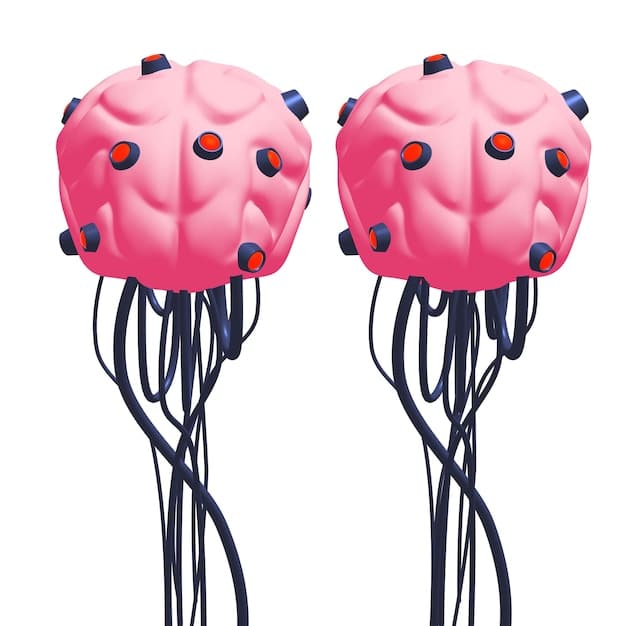Boost Your Mood: The Role of Nutrition in Mental Health

Nutrition plays a critical role in mental health by influencing brain function and emotional well-being; specific foods can enhance mood, boost energy levels, and even help manage symptoms of mental health conditions.
Did you know that what you eat can significantly impact your mental state? The role of nutrition in mental health: foods that can boost your mood and energy levels is a fascinating area, revealing a direct link between your diet and overall well-being. Let’s explore how specific foods can make a difference.
Understanding the Gut-Brain Connection
The gut-brain connection is a bidirectional communication system linking the brain and the digestive system. This intricate relationship plays a vital role in mental health, influencing mood, cognitive function, and overall well-being. Understanding this connection can help individuals make informed dietary choices to support their mental health.
The Microbiome’s Influence
The gut microbiome, composed of trillions of bacteria, fungi, and other microorganisms, significantly impacts brain health. A balanced gut microbiome supports the production of neurotransmitters, such as serotonin and dopamine, which are crucial for mood regulation.
Nutrient Absorption and Brain Function
The gut is responsible for absorbing nutrients essential for brain function. Deficiencies in key nutrients like B vitamins, omega-3 fatty acids, and magnesium can lead to mood disorders and cognitive impairments.
Here are some key factors in understanding the gut-brain connection:
- Neurotransmitter Production: The gut produces a significant portion of the body’s serotonin, influencing mood and overall feelings of well-being.
- Inflammation: An unhealthy gut can lead to chronic inflammation, which has been linked to depression and anxiety.
- Vagus Nerve: This nerve acts as a direct communication line between the gut and the brain, transmitting signals that affect mood and cognitive function.
In conclusion, the gut-brain connection highlights the importance of a healthy diet for mental well-being. By nurturing a balanced gut microbiome and ensuring optimal nutrient absorption, individuals can positively influence their mental health.

Foods Rich in Omega-3 Fatty Acids
Omega-3 fatty acids are essential nutrients known for their significant role in brain health and mental well-being. These fats, particularly EPA and DHA, are critical for brain cell structure and function, influencing mood, cognitive performance, and overall mental stability. Incorporating omega-3 rich foods into your diet can provide numerous benefits for your mental health.
Benefits of Omega-3s for Mental Health
Omega-3 fatty acids have been shown to reduce symptoms of depression, anxiety, and other mood disorders. They support healthy brain function by promoting efficient communication between brain cells and reducing inflammation in the brain.
Top Food Sources of Omega-3s
There are several excellent dietary sources of omega-3 fatty acids, including fatty fish, flaxseeds, chia seeds, and walnuts. Regularly consuming these foods can help ensure an adequate intake of these crucial nutrients.
Here are some specific food examples:
- Fatty Fish: Salmon, mackerel, and sardines are rich in EPA and DHA, the most beneficial types of omega-3s.
- Flaxseeds: Ground flaxseeds are a good source of ALA, which the body can convert into EPA and DHA.
- Chia Seeds: These seeds are also high in ALA and are easy to incorporate into smoothies, yogurt, or oatmeal.
- Walnuts: Walnuts provide ALA and other beneficial nutrients, making them a great snack for brain health.
In conclusion, omega-3 fatty acids are vital for maintaining and improving mental health. By regularly including omega-3 rich foods in your diet, you can support brain function, reduce inflammation, and enhance your overall mood.
The Power of Antioxidant-Rich Foods
Antioxidant-rich foods play a crucial role in protecting the brain from oxidative stress and inflammation, both of which can negatively impact mental health. These foods contain compounds that neutralize free radicals, reducing damage to brain cells and promoting overall cognitive function and emotional well-being. Incorporating a variety of antioxidant-rich foods into your diet can significantly support your mental health.
How Antioxidants Protect the Brain
Antioxidants combat oxidative stress by neutralizing free radicals, unstable molecules that can damage cells. Chronic oxidative stress has been linked to various mental health disorders, including depression and anxiety.
Key Antioxidant-Rich Foods
Berries, leafy green vegetables, and dark chocolate are excellent sources of antioxidants. These foods contain vitamins, minerals, and phytonutrients that protect brain cells and support healthy brain function.
Consider these antioxidant-rich options:
- Berries: Blueberries, strawberries, and raspberries are packed with antioxidants and have been shown to improve mood and cognitive function.
- Leafy Green Vegetables: Spinach, kale, and collard greens are rich in vitamins, minerals, and antioxidants that support brain health.
- Dark Chocolate: Choose dark chocolate with a high cocoa content (70% or more) to enjoy its antioxidant benefits.
In summary, antioxidant-rich foods are essential for protecting the brain from oxidative stress and inflammation. By incorporating a variety of these foods into your diet, you can support cognitive function, improve mood, and enhance your overall mental well-being.
B Vitamins and Mental Well-being
B vitamins are essential for brain health and mental well-being, playing a crucial role in energy production, neurotransmitter synthesis, and nerve function. Deficiencies in B vitamins can lead to a range of mental health issues, including depression, anxiety, and cognitive decline. Ensuring an adequate intake of B vitamins through diet or supplementation is vital for maintaining optimal mental health.
The Role of B Vitamins in the Brain
B vitamins, such as B6, B9 (folate), and B12, are involved in the production of neurotransmitters like serotonin, dopamine, and norepinephrine, which regulate mood and cognitive function. They also support the health of nerve cells and ensure efficient energy production in the brain.
Food Sources of B Vitamins
B vitamins can be found in a variety of foods, including whole grains, lean meats, leafy green vegetables, and legumes. Consuming a balanced diet rich in these foods can help prevent B vitamin deficiencies and support mental health.
Here are some great sources of B vitamins:
- Whole Grains: Brown rice, oats, and whole wheat bread provide B vitamins and fiber, supporting overall health.
- Lean Meats: Chicken, turkey, and fish are excellent sources of B vitamins, particularly B12.
- Leafy Green Vegetables: Spinach, kale, and collard greens are rich in folate and other essential nutrients.

In conclusion, B vitamins are crucial for maintaining brain health and mental well-being. By consuming a diet rich in B vitamins, individuals can support neurotransmitter synthesis, nerve function, and overall cognitive performance, reducing the risk of mental health issues.
The Importance of Protein and Amino Acids
Protein and amino acids are essential for brain function and mental health, serving as the building blocks for neurotransmitters, which regulate mood, sleep, and cognitive processes. Adequate protein intake ensures that the brain has the necessary resources to produce these vital chemicals, supporting overall mental well-being. Incorporating protein-rich foods into your diet can positively influence your mental state.
Protein’s Role in Neurotransmitter Synthesis
Amino acids, derived from protein, are used to synthesize neurotransmitters like serotonin, dopamine, and norepinephrine. These neurotransmitters play critical roles in mood regulation, stress response, and cognitive performance.
Excellent Protein Sources
Lean meats, poultry, fish, eggs, legumes, and nuts are excellent sources of protein. These foods provide a variety of amino acids essential for brain function and mental health.
Consider these protein-rich options:
- Lean Meats and Poultry: Chicken, turkey, and lean beef provide amino acids necessary for neurotransmitter synthesis.
- Fish: Salmon, tuna, and other fish are not only rich in protein but also in omega-3 fatty acids, supporting brain health.
- Legumes: Beans, lentils, and chickpeas are plant-based protein sources that also provide fiber and other essential nutrients.
In summary, protein and amino acids are vital for maintaining brain function and mental health. By including a variety of protein-rich foods in your diet, you can support neurotransmitter synthesis, improve mood, and enhance overall cognitive performance.
Hydration and Mental Clarity
Hydration plays a vital role in maintaining brain function and mental clarity. Dehydration can lead to impaired cognitive performance, mood disturbances, and increased stress levels. Ensuring adequate hydration is essential for supporting brain health and overall mental well-being. Staying well-hydrated can have a significant positive impact on your mental state.
How Dehydration Affects the Brain
Dehydration can cause brain cells to shrink, leading to impaired cognitive function, difficulty concentrating, and mood changes. Adequate hydration ensures that brain cells function optimally, supporting mental clarity and emotional stability.
Hydration Tips for Mental Health
Drink plenty of water throughout the day, and include hydrating foods like fruits and vegetables in your diet. Avoid excessive consumption of sugary drinks and caffeine, which can contribute to dehydration.
Here are some simple hydration tips:
- Drink Water Regularly: Aim to drink at least 8 glasses of water per day.
- Eat Hydrating Foods: Include fruits and vegetables like watermelon, cucumbers, and spinach in your diet.
- Avoid Sugary Drinks: Limit consumption of sodas and sweetened beverages, which can lead to dehydration.
In conclusion, hydration is crucial for maintaining brain function and mental clarity. By staying adequately hydrated and incorporating hydrating foods into your diet, you can support cognitive performance, improve mood, and enhance your overall mental well-being.
Limiting Processed Foods and Sugar
Limiting processed foods and sugar is essential for maintaining mental health. High consumption of these items can lead to inflammation, blood sugar imbalances, and nutrient deficiencies, all of which can negatively impact mood and cognitive function. Focusing on whole, unprocessed foods can support better mental health outcomes.
The Negative Impact of Processed Foods
Processed foods are often high in unhealthy fats, added sugars, and artificial additives, which can promote inflammation and disrupt gut health, leading to mood disorders and cognitive decline.
The Effects of Sugar on Mental Health
Excessive sugar consumption can cause blood sugar spikes and crashes, leading to mood swings, irritability, and fatigue. It can also contribute to inflammation and disrupt the balance of neurotransmitters in the brain.
Consider these tips for limiting processed foods and sugar:
- Read Food Labels: Be aware of added sugars, unhealthy fats, and artificial additives in processed foods.
- Choose Whole Foods: Focus on consuming whole, unprocessed foods like fruits, vegetables, lean proteins, and whole grains.
- Limit Sugary Drinks: Avoid sodas, sweetened beverages, and excessive fruit juice consumption.
In summary, limiting processed foods and sugar is crucial for maintaining mental health. By focusing on whole, unprocessed foods and moderating sugar intake, you can reduce inflammation, stabilize mood, and support overall cognitive function.
| Key Point | Brief Description |
|---|---|
| 🧠 Gut-Brain Connection | Highlights the importance of a healthy gut microbiome for mental well-being. |
| 🐟 Omega-3 Fatty Acids | Essential for brain cell structure and function, helping reduce inflammation and improve mood. |
| 🍓 Antioxidant-Rich Foods | Help protect the brain from oxidative stress and inflammation, supporting cognitive function. |
| 💧 Hydration | Sufficient water intake is necessary for optimizing brain performance, mental clarity, and mood. |
Frequently Asked Questions (FAQ)
▼
Nutrition affects mental health by providing essential nutrients that support brain function, neurotransmitter production, and overall emotional well-being. What you eat directly influences your cognitive performance and mood.
▼
Foods rich in omega-3 fatty acids (like salmon), antioxidants (such as berries), and B vitamins (like leafy greens) can enhance mood and cognitive function. These nutrients support optimal brain health.
▼
Yes, processed foods can negatively impact mental health due to their high sugar, unhealthy fats, and artificial additives, which can cause inflammation and disrupt gut health, leading to mood disorders.
▼
Hydration is crucial for maintaining brain function and mental clarity. Dehydration can impair cognitive performance and mood. Drink enough water and eat hydrating foods for optimal mental health.
▼
Yes, dietary changes can significantly improve mental health. By focusing on nutrient-rich foods and limiting processed items, you can support brain function, enhance mood, and improve overall well-being.
Conclusion
In conclusion, the role of nutrition in mental health is undeniable. By focusing on a balanced diet rich in essential nutrients, limiting processed foods and sugar, and staying hydrated, you can significantly enhance your mood, energy levels, and overall mental well-being. Embrace these dietary changes to support a healthier and happier mental state.





